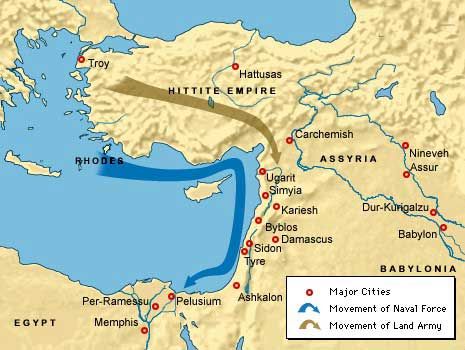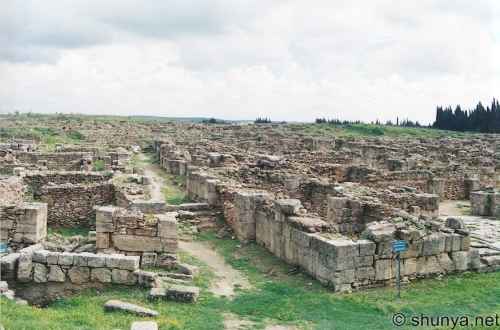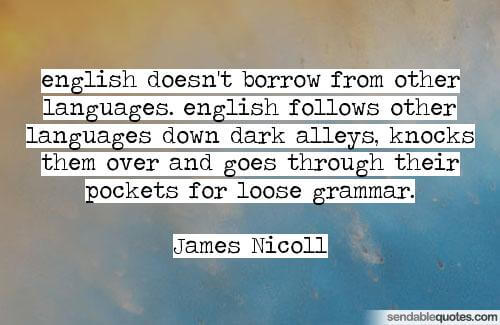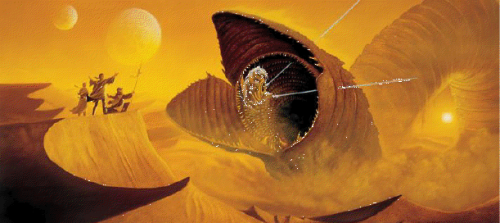Something Old, Something New, Something Borrowed, Something Blue

Something/Someone Old

This music, "Hurrian Hymn No.6," is the oldest melody known to humanity. (I wonder how it could be "No. 6" when it's the oldest, but never mind.) It dates back to 1400 B.C.
It's not the oldest known complete musical composition, though. That one is a memorial piece of music from Turkey called the Seikilos Epitaph. It's much more recent, dating from 1 AD. Its lyrics and music were engraved on a tombstone:
The Hurrian Hymn No. 6 was found in Ugarit, Syria, which is an ancient, ruined city on the Mediterranean coast.


It must be a really amazing place, because it's also the site of possibly the oldest surviving human alphabet (it's a debate whether the Ugaritic or Phoenician alphabet came first).
Something New

This was built in 2013, so I guess it's not, strictly speaking, "new," but it's a design I've never seen before, and it's new enough. This is a library staircase with a built-in slide, from a house designed by Korean architect Moon Hoon:

I'm not really sure I'd like to have kids sliding down onto the wood floor below--seems harder than the ground--but they seem happy:

He's turned the stairwell into a home theater, which I think might sometimes create traffic jams, but does have the virtue of taking the TV out of the main living space:

I really love this: the underneath of the stairs becomes work space. The adults can use the table surface; the kids can climb on it and (I think?) pull down books:

I guess it actually depends on which direction the books are shelved. Since there's no back to the book/staircase, they could be shelved facing either direction.
This is a nice image of it:

Something Borrowed


As someone interested in language, I like to know the origins of words. I'm particularly interested in loanwords, as they can be a rich source of information on the interactions between cultures--or, at least, a fruitful ground for speculation.
Turns out we English speakers borrowed the word "war" from the French, who borrowed it from the Germans:
The English word war derives from the late Old English (circa.1050) words wyrre and werre, from Old French werre (also guerre as in modern French), in turn from the Frankish *werra, ultimately deriving from the Proto-Germanic *werzō 'mixture, confusion'. The word is related to the Old Saxon werran, Old High German werran, and the German verwirren, meaning “to confuse”, “to perplex”, and “to bring into confusion”.[13] In German, the equivalent is Krieg (from Proto-Germanic *krīganą 'to strive, be stubborn'); the Spanish, Portuguese, and Italian term for "war" is guerra, derived like the Old French term from the Germanic word.[14] Etymologic legend has it that the Romanic peoples adopted a foreign, Germanic word for "war", to avoid using the Latin bellum, because, when sounded, it tended to merge with the sound of the word bello ("beautiful").[citation needed]
Apparently, the speakers of Old English did have words they used when talking about what the Romans called bellum, but most of them were poetic and not used in ordinary talk; the one that was, gewin, interestingly did not precisely mean "war," but rather "trouble" or "strife." So the Irish, when talking of "the Troubles" are actually closer to the old English understanding of war than one might think.
I find it likewise interesting that the Germanic word which became the Frankish word which became the French word which became the English word for "war," originally meant "to confuse" or "to perplex" or to "bring into confusion." It's interesting that those Germanic tribes saw war as the opposite of clarity, or perhaps as the opposite of order.
As for English following other languages into dark alleys and mugging them for their grammar--it's an appealing notion that is congruent with my understanding of our culture--but then I looked at this table:

I can't help but noticing that all the major players who were mugged by English for their grammar, with the possible exception of the Greeks, invaded and conquered England. We've got Latin (the Romans) Old Norse (the Vikings), French and Anglo-French (the Normans). It seems that other than Old English itself, and Greek (which probably came in through scholarly works), most of the words came from conquerors, rather than victims.
Something Blue

My Something Blue today is fictional: the glow of spice addiction from Frank Herbert's famous science fiction trilogy Dune. Well, it's more than a trilogy, but I only liked the first three books; the fourth I had a sort of mixed reaction to, and I didn't go any further.

The Dune wiki (http://dune.wikia.com/wiki/Spice_Melange) says the following about the role of "the spice," or "melange," in Herbert's fictional universe:
The Spice Melange, commonly referred to simply as 'the spice', was a naturally produced awareness spectrum narcotic that formed a fundamental block of commerce and technological development in the known universe for millennia. It also played an important role in travel and cultural development.
The spice originated on the planet Arrakis, where it was produced deep beneath the sands. It was created in a process whereby the fungal excretions of sandtrout would mix with water to form a pre-spice mass. This mass would then be brought to the surface of the desert through an explosion of pressure, and under the intense heat and air of Arrakis, melange would form. When the worms died, sandtrout would be released into the sand, and the cycle of creation would repeat.
This is what the sandworms look like:

Since its discovery, several thousand years prior to the ascent of House Atreides, it was produced exclusively on the planet Arrakis. This was because the conditions on Arrakis by which melange was created were unique to that planet. However, some 1500 years after the death of the God-Emperor Leto II, the Bene Tleilax had managed to successfully replicate it.
By the time House Atreides arrived on Arrakis [the time period of Herbert's books], melange had become the single resource that was capable of creating or destroying the empire. Consequently, Arrakis had gone from being a distant, poor, and unimportant desert world to a greatly prized fief, and management of the spice mining operations were considered a prestigious but difficult task. Spice collection was hindered both by the aggressive and territorial sandworms, and by the guerrilla tactics employed by the Fremen, who resented the presence of off-worlders (especially Imperial agents) who harvested the spice for themselves.
For the Fremen, the natives of the planet, the spice was a religious, even a mystical experience. That may have been part of why they resented the incursion of offworlder addicts and profiteers.
During the days of the Corrino Empire, the spice was the rarest and most valuable commodity in the known universe. It was said that it was so valuable that one briefcase full of spice would be enough to purchase an entire planet.
Sometimes I wonder if Herbert were thinking about oil and the Middle East when he invented his story of the poor desert world in possession of an incredibly valuable substance that suddenly catapulted it into the center of galactic intrigue and power struggles. I don't know a lot about Herbert, mainly because I liked his trilogy, rather than loving it, so I don't know if my interpretation is off base or not. I think I'm probably wrong, because Herbert's spice, unlike petroleum, has a mystical and transformative effect on human beings:
Effects on those who consume melange are outlined below:
Mind altering: it could awaken dormant parts of the human mind and encourage expanded sensory perceptions. In some humans (notably the Bene Gesserit, Guild Navigators, and some members of the Atreides bloodline), heavy doses led to powerful abilities that include prescience;
Health benefits: taken regularly it increased life expectancy and fortified over all health levels (in many cases life expectancy was tripled);
Addictiveness: the spice had narcotic properties, thus increasing demand and creating a large and hungry market for it. An individual's addiction to the spice would worsen the more they consumed it.
Physical effects: sustained use of the spice led to human eyes being discolored so that the entire eye would be stained blue - so called Eyes of Ibad. Extensive exposure to the spice created a huge physical dependency that could radically alter the entire body (see Guild navigators).
So how are y'all doing today?


Comments
What a great library. I love
What a great library. I love the idea of getting kids to enjoy a library space. It's a library slash playground. My whole family is a bunch of bookworms. We would never emerge from a space like that.
As far as the Dune mysterious spice substance, I think of sugar. Though sugar doesn't have a mystical quality to it, it is highly addictive. I don't know if the creatures in Dune are as vulnerable to addictions as we human creatures are, but fortunes are made and wars are fought to feed our various addictions. The history of sugar involves brutal colonizing, slavery, thievery, and great fortunes for those willing to employ those worst practices. I recently finished reading The Case Against Sugar by Gary Taubes. It may read a bit like Dune.
@randtntx I know what you mean. If
I know what you mean. If I could have afforded to design a house, rather than buying one, I think every available wall outside the bathrooms would have shelves built in to them from the beginning!
"More for Gore or the son of a drug lord--None of the above, fuck it, cut the cord."
--Zack de la Rocha
"I tell you I'll have nothing to do with the place...The roof of that hall is made of bones."
-- Fiver
@randtntx Sugar is a very
Sugar is a very interesting comparison to the spice. The spice is a bit weird, though, in that it offers health benefits to the body at the same time that it creates what can be a devastating addiction.
I just found something that claimed that Herbert's actual inspiration for the spice was magic mushrooms:
http://gadgets.boingboing.net/2008/04/04/the-unsurprising-psy.html
But I don't really know if psilocybin is massively addictive like the spice is. I never thought it was--have never heard of people doing magic mushrooms daily, or anything like that.
"More for Gore or the son of a drug lord--None of the above, fuck it, cut the cord."
--Zack de la Rocha
"I tell you I'll have nothing to do with the place...The roof of that hall is made of bones."
-- Fiver
Fascinating bit about the
Fascinating bit about the ancient lute.
Here's a variation and update on that theme. From Lute to Klezmer to Rap?
https://youtu.be/yvEWNlcefAw?list=RDyvEWNlcefAw
(Sorry, I don't know how to eliminate the add.)
@randtntx That is *awesome*, rand!
That is *awesome*, rand!
"More for Gore or the son of a drug lord--None of the above, fuck it, cut the cord."
--Zack de la Rocha
"I tell you I'll have nothing to do with the place...The roof of that hall is made of bones."
-- Fiver
@Cant Stop the Macedonian Signal So glad you like it!
So glad you like it!
Here's another, in a different vein though. Off topic but very different.
https://youtu.be/m3lF2qEA2cw
I wish I could fill an extra long and deep claw-footed bath
tub with this essay and soak in it. Thank you!
I had thought that the Phoenicians were coastal Syrians, when Syria included most of what is now Lebanon. However, if that were correct, there would be no argument over which alphabet came first, the Phoenician or the one from the coastal Syrian city of Ugarit. So, I have to look further into Phoenicians and "Great Syria." Meanwhile, the wars in Syria among Isis and USis and the Syrians (Russkies?) have been destroying the antiquities, along with everything else in Syria. Soon, we'll be able to see only what the US and Europe looted and display in museums. The Louvre is good for Syrian mummies in stone sarcophagi, if you happen to be in Paris and in a mummy mood.
Linguistics classes English as an Indo-European language, whatever that means. I grokked cases (nominative and objective) in English grammar only after I studied Latin, which, believe it or not, I enjoyed very much. Imagine when kids conversed in Greek and Latin (Biblical translation languages) as part of elementary schooling!
Health care: This part got so long, I decided to turn it into an essay of its own.
Today's summer meal treat: I order my groceries. This time, almost every produce item I ordered arrived in sub par condition. However, 15 marvelous tomatoes for which I was not charged were added, at no charge, to the 6 marvelous tomatoes that I had ordered, for a total of 21 marvelous tomatoes. I have no idea if extra tomatoes were to make up for the rest of the stuff, but I will make gazpacho today.
I was taught to serve gazpacho with a wonderful, crusty bread, hard-cooked eggs and diced sides of the main gazpacho ingredients, namely cukes, green peppers and onions (which I picked up from a convenience store last night) and tomatoes. (I don't include bread in my gazpacho, though many recipes call for it.) Per Jacques Pépin, the eggs will be "hard-cooked," not "hard-boiled." That means that the eggs will have a a bright, golden center and a white outer part--none of that pale yellow, mealy yolk with nasty green sulphuric mess between the yolk and a rubbery white, all characteristic of eggs that have been boiled too long. Fortunately, a bakery in my neighborhood turns out the most marvelous breads from 8 am to 9 pm. I've sometimes bought French baguettes so hot out of the oven that they became U-shaped as I walked home. But, they were all still marvelously crusty and yummy when they cooled.
Have a magical summer day, CStMS and everyone else.
@HenryAWallace As always, thank you for
As always, thank you for your kind words, HAW.
I just found out, by delving a little deeper, that what "Phoenician" is is way more complicated than I thought.
Phoenicia is an Ancient Greek term used to refer to the major export of the region, cloth dyed Tyrian purple from the Murex mollusc, and referred to the major Canaanite port towns, and it does not correspond exactly to a cultural identity that would have been recognised by the Phoenicians themselves. Their civilization was organized in city-states, similar to those of Ancient Greece,[3] perhaps the most notable of which were Tyre, Sidon, Arwad, Berytus and Carthage. Each city-state was a politically independent unit, and it is uncertain to what extent the Phoenicians viewed themselves as a single nationality. In terms of archaeology, language, lifestyle, and religion there was little to set the Phoenicians apart as markedly different from other residents of the Levant.
Now it's looking to me like the Phoenician alphabet is more like a trade language, maybe developed because these traders went so damned far (their trade routes blow my mind given the level of their tech)
This might explain why there are apparently lots of similarities between the Ugaritic and Phoenician alphabets:
How the Ugaritic alphabet developed is unknown. Some scholars believe it was a unique innovation, a genuine attempt to simplify cuneiform whilst others believe that because Ugarit’s alphabet was unique to the city, it represented a localized development from earlier Semitic alphabetic systems. Others believe it was influenced by Phoenician alphabet, the precursor of the systems later used by the Greeks and Romans-in other words the ancestor of alphabets today.
However, the earliest known inscription of the Phoenician alphabet is 500 years later that that of Ugarit. Although the Ugaritic alphabet did not spread in its original form, its principles, such as the fixed set of symbols including vowels and consonants did continue.
http://decodedpast.com/ugarit-origins-alphabet-writing-ancient-history/1...
I may have to do actual research on this, with books. It sounds quite complicated, and also a subject of much debate.
"More for Gore or the son of a drug lord--None of the above, fuck it, cut the cord."
--Zack de la Rocha
"I tell you I'll have nothing to do with the place...The roof of that hall is made of bones."
-- Fiver
Except the Phoenician and Ugarit alphabets
were Semitic alphabets, at least as the word "Semitic" was used before some people objected to Arabs being included in the term "Semite."
https://en.wikipedia.org/wiki/Semitic
https://en.wikipedia.org/wiki/Semitic_languages
The Phoenicians and Ugarits lived smack in the "Levant."
https://en.wikipedia.org/wiki/Levant
And, as I said, based on what I thought the term "Phoenicians" covered, the Ugarits would have been part of Phoenicians.
Me? I wouldn't put any money on which alphabets came first in reality, regardless of what may or may not have survived for archaeologists to discover.
This is horrific:
Meanwhile, the wars in Syria among Isis and USis and the Syrians (Russkies?) have been destroying the antiquities, along with everything else in Syria. Soon, we'll be able to see only what the US and Europe looted and display in museums.
and confirms my notion that one of the wars going on here is a war on civilization and history themselves. One could say that all wars are wars on civilization and history, but it seems more pointed on this occasion. Usually people don't go after relics of long-dead civilizations in a war.
"More for Gore or the son of a drug lord--None of the above, fuck it, cut the cord."
--Zack de la Rocha
"I tell you I'll have nothing to do with the place...The roof of that hall is made of bones."
-- Fiver
Weren't the contents of the Baghdad museum stolen the
first night of the invasion? I seem to remember that the US expected that to happen, yet made no attempt to stop it. Hell, for all I know, we did it. If the US invented my town, my first thought would not have been to gather my friends and head over to the museum immediately, but what do I know? The US blames the alleged desire of radical Muslims to eliminate anything pagan, Christian or non-Muslim. I'll reserve judgement on that one.
But I didn't mean to mislead. I just assume antiquities are being destroyed, all with everything else. Because war, bombing, etc. I had no specific destruction of antiquities in mind.
@HenryAWallace There is, actually,
There is, actually, specific on-purpose destruction of antiquities happening, along with the incidental destruction that always accompanies war:
http://news.nationalgeographic.com/2015/04/150414-why-islamic-state-dest...
although I suppose even National Geographic might be lying, in this day and age, I'm gonna give them the benefit of the doubt.
But I think IS has both ideological and, erm, more secular reasons for their destruction of antiquities:
http://www.ndtv.com/world-news/russia-leads-un-initiative-to-target-isla...
"More for Gore or the son of a drug lord--None of the above, fuck it, cut the cord."
--Zack de la Rocha
"I tell you I'll have nothing to do with the place...The roof of that hall is made of bones."
-- Fiver
Good morning
Can't begin to imagine how the designed for the library was even conjured up. Inspired. Love your OTs. They are always filled with incredibly interesting stuff. The OT crew sets a very high bar indeed.
"Religion is what keeps the poor from murdering the rich."--Napoleon
@dkmich Thanks, dk! Hope you're
Thanks, dk! Hope you're having a good summer up there in Michigan.
"More for Gore or the son of a drug lord--None of the above, fuck it, cut the cord."
--Zack de la Rocha
"I tell you I'll have nothing to do with the place...The roof of that hall is made of bones."
-- Fiver
Good morning, everybody!
"More for Gore or the son of a drug lord--None of the above, fuck it, cut the cord."
--Zack de la Rocha
"I tell you I'll have nothing to do with the place...The roof of that hall is made of bones."
-- Fiver
Morning CStMS
And now boys and girls another installment of 'Provocative Essay's by Umair'...
Today we give you one from yesterday...
'The United States of Nothing'
The lede :
The whole here - https://medium.com/bad-words/the-united-states-of-nothing-2ce3123a76d6
This has been another edition of 'Provocative Essay's by Umair'...
I want a Pony!
@Arrow We no longer have values.
We no longer have values. We did have some. We didn't live up to them much of the time, and sometimes massively failed to do so, pretty much maximizing hypocrisy levels around here, but homo sapiens often fails to live up to stated cultural values, regardless of where they're living, what language they're speaking, or what the values are.
A common mistake is to assume that if there are failures to abide by cultural values, those values must not exist. This is, in my view, an excessively simplistic reading of human culture and morality (I'm not saying anybody in this OT has been advocating that view).
We were not that good a culture; our civilization was young and laboring under some deficits from the beginning. But many of us had a good will to work to build a better civilization--in fact, that was one of the original impulses that motivated creating a nation here. We were (at least some of us were) attempting to build a civilization consciously, on purpose, which is something that most civilizations can't say. And the (stolen) land we were trying to build it on could have helped us massively, given that it was resource-rich and isolated from most of the rest of the world. We could have made a go of it, I think.
Without the 3/5 compromise and its repulsive accompanying ideas, it would have (obviously) been far better and easier to succeed at the task.
However, what's going on now has the same relationship to American culture that the xenomorph in Alien has to the body of its host. It makes use of what it can in the host culture, destroys what it can't, and ends by basically exploding the whole thing from the inside out. There has been an assault on American culture since the 1970s, and over the past 15 years or so, it's become, to anyone trained to study cultures, horrifically obvious that what's being done to American culture resembles demolition more than anything else.
Unfortunately, rather than analyzing or attempting to deal with this fact, most people seem to want to either rage (Donald Trump supporters, Tea Partiers), pretend it isn't happening (Democrats, Clinton supporters, Bush/mainstream Republican supporters), or cheer/sneer (much of the independent left). The level of analysis that could lead people to make logic chains like "Slavery was evil and the genocide of indigenous people was evil, therefore the culture is intrinsically evil, therefore anything that destroys it is to be welcomed" is, to be polite, lacking and also happens to be a regular line of defense used by the establishment to avoid responsibility for creating horrors.
Sorry. This is a pet peeve of mine.
"More for Gore or the son of a drug lord--None of the above, fuck it, cut the cord."
--Zack de la Rocha
"I tell you I'll have nothing to do with the place...The roof of that hall is made of bones."
-- Fiver
@Cant Stop the Macedonian Signal I'm hearing you CStMS.
I'm hearing you CStMS.
All valid points.
I don't know...Being a 'progressive'(in the true sense) one must be hopeful. Hope as a humanist in fundamental values and hope that we are not so programed by 'human nature'(however one rationalizes one's onerous deeds) that we loose sight of the ability to learn(from history) and to think rationally to promote fundamental humanist values.
(Wow deep thoughts...:))
I want a Pony!
@Cant Stop the Macedonian Signal Well, we could cobble
Well, we could cobble together a few slogans that seem to inspire Americans to be a bit better (at least it works briefly every 4 years). I think 'Mothers for making America great again with hope and change' might work. At the very least it could make us laugh a bit.
With the kind of an outlook of those mothers we could spend money on infrastructure instead of bombs. We could build instead of destroy. Our kids would be better off, they would have a better quality of life. We wouldn't spend our treasure on destroying antiquities (or people) in other countries. Wow what (an obvious) concept. Too bad the smart people in flyover country have no power.
@Arrow I both agree and don't
I both agree and don't agree with that excellent essay. Agree more than disagree.
He finds it easier than I do to simply conclude that "America" began in nihilism and never had any values and is ending the same way. It's a neat narrative.
"More for Gore or the son of a drug lord--None of the above, fuck it, cut the cord."
--Zack de la Rocha
"I tell you I'll have nothing to do with the place...The roof of that hall is made of bones."
-- Fiver
Being of German heritage,
I got click-baited into watching the YouTube channel "Don't Trust the Rabbit". Trixie is a German with short clips translating common German sayings into English or American concepts into German. One I passed on, though, was the longest German word, as the click-pic showed a word that looked to take the entire 5 minutes of the clip just to read off.
Books under the stairs seems to be a recipe for a wrenched ankle if not a full-blown Linda Blair.
There is no such thing as TMI. It can always be held in reserve for extortion.
GM, CSTMS, I just got back from an early morning medical
procedure and am still groggy from the anesthetic. To my addled brain, that Hurrian hymn sounds highly derivative, so, of course it is the 6th.
I have a hunch tha Herbert fabricated spice from the characteristics of various compounds, hence "melange"
Off the top of my head, possible components that come to mind are opium, psilocybin, and ergot/ergotamine.
That, in its essence, is fascism--ownership of government by an individual, by a group, or by any other controlling private power. -- Franklin D. Roosevelt --
@enhydra lutris First things first...
First things first...
enhydra, are you OK?
Second--
very good point about the "melange!" I should have caught that.
"More for Gore or the son of a drug lord--None of the above, fuck it, cut the cord."
--Zack de la Rocha
"I tell you I'll have nothing to do with the place...The roof of that hall is made of bones."
-- Fiver
Oh yeah, periodic look at a chronic problem,
not too invasive, but anesthetics anyway. It's still there, but not worse, so keep on keepin' on and be a good boy and all that.
That, in its essence, is fascism--ownership of government by an individual, by a group, or by any other controlling private power. -- Franklin D. Roosevelt --